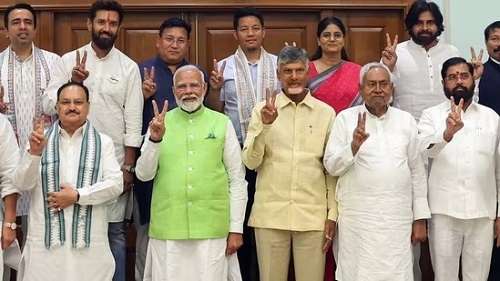
NDA’s victory and Modi’s leadership: What now?
By Dr. Avi Verma Publisher
With the NDA securing 293 seats in the 2024 Lok Sabha elections, PM Narendra Modi is set to lead the government for another term. However, the reduced majority compared to previous elections raises significant questions about the stability and effectiveness of the new administration.
A Major Blow to Modi’s Leadership
Narendra Modi continues as prime minister, but the manner in which he won represents a major blow. His ruling party, the Bharatiya Janata Party (BJP), expected to dominate the polls but could not secure a majority without the help of allies. The BJP won only 240 seats, relying on the smaller parties within the National Democratic Alliance (NDA) to achieve a majority in the 543-member Lok Sabha. For a BJP that previously enjoyed a majority on its own with 303 seats in 2019, this is a stark shift in its grip on power.
Coalition Dynamics and Kingmakers
With his allies now holding the balance of power, Modi must balance his governing with securing their loyalty. Two of the biggest players in the coalition, the Telugu Desam Party (TDP) and the Janata Dal (United) [JD(U)], hold a combined 28 seats and are led by politicians known for switching loyalties. This dynamic makes the coalition’s stability precarious, as these allies could potentially align with the Indian National Developmental Inclusive Alliance (INDIA) if their interests are not adequately addressed.
Challenges Ahead
PM Modi’s leadership has been characterized by a dynamic and proactive approach, focusing on development, national security, and economic reforms. Maintaining this vibrant style will be crucial but challenging given the new political landscape and reduced majority. The NDA’s ability to navigate complex political terrain and maintain unity among diverse partners will be key to sustaining a stable government over the next five years.
Impact of Secularism and Ram Mandir
Secularism played a nuanced role in the 2024 elections. While the BJP’s Hindutva ideology has been a point of contention, the completion of the Ram Mandir in Ayodhya resonated strongly with a significant portion of the electorate, consolidating support among Hindu voters. However, the focus on Hindutva also alienated some sections of the population, contributing to the loss of seats in states like Uttar Pradesh and Maharashtra, where issues of economic distress and agrarian crisis were more pressing.
Surge in Rahul Gandhi’s Standing
The 2024 elections marked a significant resurgence for the Indian National Congress, with the party doubling its numbers in the Lok Sabha from the previous election. This surge has significantly bolstered Rahul Gandhi’s political standing, positioning him as a credible leader and a formidable opponent to the BJP.
Challenges and Opportunities for Rahul Gandhi
While the increase in seats is a positive development for the Congress, Rahul Gandhi faces numerous challenges. The new political realities require him to navigate coalition dynamics within the INDIA alliance effectively, maintain party unity, and continue rebuilding the Congress’s organizational strength. The surge in numbers provides an opportunity for Gandhi to capitalize on the momentum and address the issues that resonate with the electorate, such as economic inequality, unemployment, and social justice.
Rahul Gandhi’s ability to overcome these challenges and leverage the increased parliamentary presence will be crucial. The enhanced visibility and influence in the Lok Sabha give him a platform to push forward his agenda and counter the BJP’s policies. However, sustained success will depend on strategic alliances, effective communication, and addressing the diverse needs of the electorate.
Prospects for Another Full Term
The slim majority suggests that internal and external pressures could impact the coalition’s stability. Managing these dynamics effectively will be crucial for completing another full term. The BJP’s ability to work harmoniously with its allies and address regional concerns will be pivotal. Moreover, fulfilling the agenda of continued economic reforms, infrastructure development, and social policies will depend on effective governance and coalition management.
Conclusion
The NDA’s victory in the 2024 elections, while significant, comes with its set of challenges. PM Modi’s leadership will be crucial in navigating the complexities of coalition politics and maintaining a stable government. The next five years will test the NDA’s ability to deliver on its promises and continue India’s trajectory of growth and development. The evolving political landscape will require adaptability, strategic alliances, and a continued focus on addressing the needs and aspirations of the Indian populace.
The 2024 elections have highlighted the importance of coalition politics in India and the need for inclusive governance. As the NDA prepares to govern with a reduced majority, the focus will be on maintaining stability, fulfilling electoral promises, and ensuring that the diverse voices within the coalition are heard and respected. The political journey ahead will be challenging, but it also presents an opportunity for the NDA to reinforce its commitment to India’s development and democratic resilience.
Simultaneously, Rahul Gandhi’s strengthened position provides a counterbalance and the potential for a more robust opposition, which is essential for a healthy democracy. His ability to navigate the new political landscape and address key issues will determine whether the Congress can sustain and build upon its gains, offering a viable alternative to the electorate in future elections.